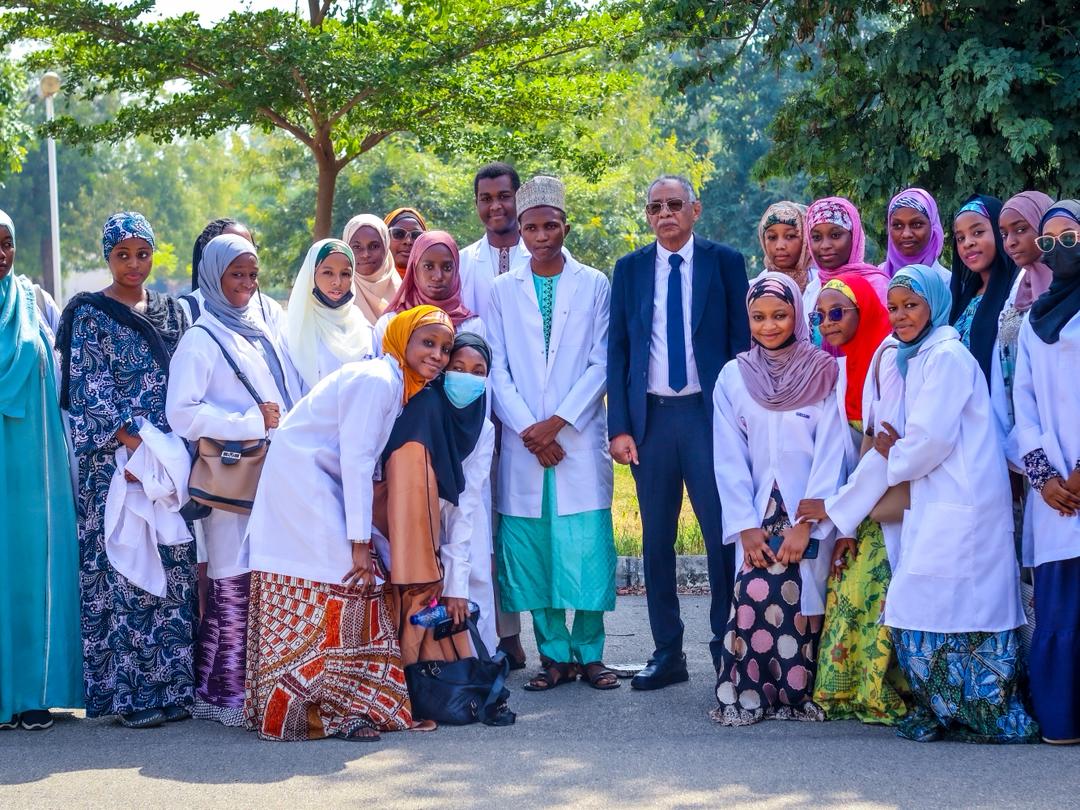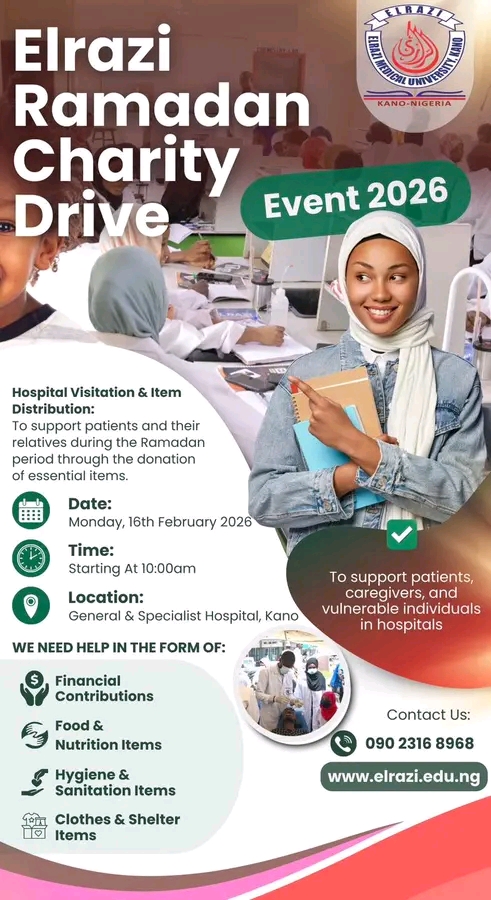 Health
Health
Bachelor of Nursing Science (BNSc) – Programme Overview
The Bachelor of Nursing Science (BNSc) programme at Elrazi Medical University leads to professional qualification, registration, and licensing with the Nursing and Midwifery Council of Nigeria.
It is a patient-centered, practice-oriented programme that integrates rigorous theoretical instruction with extensive clinical experience to prepare students for excellence in nursing practice.
Throughout the course of study, students receive instruction from experienced nursing educators and allied health professionals, supported by modern teaching resources and simulation-based learning. The programme emphasizes the development of core clinical competencies such as patient assessment, nursing diagnosis, care planning, implementation, and evaluation — all delivered through innovative methods and state-of-the-art facilities.
Students are also exposed to interactive simulation environments, enabling them to gain real-world confidence in managing critically ill patients and applying evidence-based nursing interventions.
Career Opportunities
Graduates of the BNSc Nursing programme are equipped with the academic, clinical, and professional competencies necessary to excel in a broad range of healthcare careers.
The philosophy of the Nursing programme at Elrazi Medical University is to produce clinically competent, ethically grounded, and globally competitive nurses who demonstrate excellence in patient care and leadership in diverse healthcare settings.
Potential Career Paths Include:
-
Registered Nurse (RN): Deliver comprehensive patient care, administer treatments, and educate patients and families on healthcare management.
-
Nurse Practitioner: Provide diagnostic and therapeutic services, prescribe medications, and collaborate with other healthcare professionals.
-
Clinical Nurse Specialist: Offer expert consultation and advanced care in specialized areas such as critical care, pediatrics, or oncology.
-
Nurse Educator: Design and deliver academic and professional development programmes in universities and healthcare institutions.
Employment Opportunities Are Available In:
-
Hospitals: Deliver evidence-based care in multidisciplinary teams across general and specialty units.
-
Community Health Centers: Provide accessible, community-based health services and preventive care.
-
Long-Term Care Facilities: Offer continuing care for patients with chronic illnesses or rehabilitation needs.
-
Home Healthcare Services: Deliver patient-centered care in home settings, ensuring continuity and comfort.
Additionally, the programme nurtures entrepreneurial and leadership skills, preparing graduates to establish their own nursing practices, participate in healthcare innovation, and contribute to policy development and reform.
Programme Learning Outcomes
Graduates of the BNSc programme will be able to:
-
Apply scientific, ethical, and evidence-based principles in the provision of nursing care.
-
Demonstrate effective clinical reasoning, critical thinking, and problem-solving in healthcare delivery.
-
Communicate professionally and compassionately with patients, families, and healthcare teams.
-
Utilize modern healthcare technologies and research to improve patient outcomes.
-
Exhibit leadership and professional accountability in nursing practice.
Curriculum Structure
The BNSc programme spans five (5) academic years, divided into structured levels of progressive learning and clinical experience.
Year 1 – Foundation (Freshman Year)
Focus on basic sciences and foundational nursing knowledge.
Courses include:
- Mathematics for Health Sciences
- Physical & Inorganic Chemistry
- Mechanics and Behavior of Matter
- General Biology I–IV
- Practical Chemistry I–II, Physics Practical I–II
- English and Communication Skills
- Introduction to French Language I–II
- Statistics for Health Sciences
- Use of Library, Study Skills, and ICT
- Nigerian Peoples and Culture
- Year 2 – Core Foundations (Sophomore Year)
Emphasis on human anatomy, physiology, and basic nursing practice.
Courses include:
-
Gross Anatomy (Upper & Lower Limbs; Thorax; Abdomen; Pelvis & Perineum)
-
Basic Histology I–II, Embryology
-
Physiology (Cell, Blood, Cardiovascular, Endocrine, Respiratory, GIT)
-
Foundations of Nursing I–II
-
Clinical Nursing Practice I–II
-
General Biochemistry I–II & Practicals
-
Medical Microbiology and Parasitology
-
Developmental Psychology
-
Biostatistics
-
Entrepreneurship and Innovation
-
French Language I
-
Philosophy, Logic and Human Existence
-
Introduction to Computer Applications
Year 3 – Clinical Development (Junior Year)
Introduction to specialized clinical areas and community health.
Courses include:
-
Gross Anatomy (Head & Neck, Neuroanatomy & Special Senses)
-
Neurophysiology and Genito-Urinary Physiology
-
General Cellular Pathology and Cytology
-
Pharmacology (Systemic, Chemotherapy, Pharmaco-dynamics)
-
Medical-Surgical Nursing I–II
-
Community Health Nursing I–II
-
Maternal & Child Health Nursing I–II
-
Nursing Ethics and Philosophy
-
Medical Psychology and Sociology
-
Environmental Health
-
Nutrition and Dietetics
-
Peace and Conflict Resolution
-
French Language II
-
Venture Creation
Year 4 – Advanced Nursing Practice (Senior Year)
Focus on management, research, mental health, and advanced nursing roles.
Courses include:
-
Management of Nursing Care Services
-
Research Process in Nursing I–II
-
Curriculum Development and Teaching Methodology
-
Mental Health and Psychiatric Nursing I–II
-
Medical-Surgical Nursing III–IV
-
Maternal & Child Health Nursing III–IV
-
Medical Jurisprudence
-
French Language III
Year 5 – Professional Integration (Final Year)
Integration of advanced clinical practice, research, and specialization.
Courses include:
-
Nursing Informatics
-
Community Health Nursing III–IV
-
Community Health Nursing Practice I–II
-
Maternal & Child Health Nursing Practice IV
-
Occupational and Paediatric Nursing
-
Mental Health and Psychiatric Nursing III
-
Health Economics
-
Dermatology Nursing
-
Intensive Care Nursing
-
Research Project
Conclusion
The BNSc Nursing Programme at Elrazi Medical University provides students with an exceptional blend of academic excellence, clinical proficiency, and ethical leadership.
Graduates emerge as compassionate, skilled, and adaptable healthcare professionals — ready to make meaningful contributions to the health sector in Nigeria and globally.






